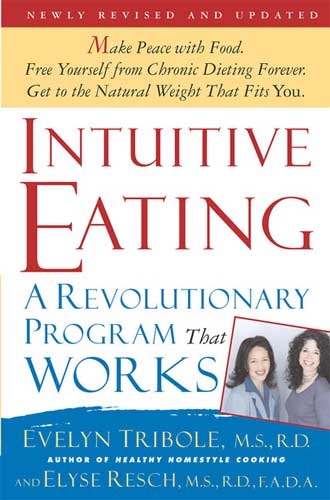
I recently had the pleasure of speaking with Evelyn Tribole, one of the co-authors of Intuitive Eating. For professionals who work with eating issues, she is like a rock star. Evelyn and her co-author, Elyse Resch, were among the first authors to provide a clear alternative to dieting. They wrote a compelling book to help people understand why it is important to throw away the fad diet books and stop obsessively stepping on the scale. The approach is compassionate and healing. It has been a lifesaver for men and women around the world who struggle with their eating, weight and body image.
In a nutshell, intuitive eating has taught people how to plug back into their bodies. It's using your natural, internal wisdom to eat when you are hungry and stop when you are full. As we all know, this is much easier said than done. Yet, people who have learned intuitive eating skills will attest to the fact that it can be done.
I asked Evelyn to share some history behind the creation of Intuitive Eating. Here are five interesting facts you may not know about this timeless book:
1) A new, completely revised edition is just around the corner. A new edition of Intuitive Eating will be released in July 2012. The updated text will contain two new chapters. One chapter will cover the intuitive eating research that has evolved in the past 10 plus years. There now are 25 scientifically-based studies that show its efficiency and validity.
2) Intuitive Eating started with a media glitch. Evelyn was making an appearance on Good Morning America. The next guest failed to appear so she had 2½ minutes to come up with a topic to fill the spot. She spoke about insatiable hunger. A publisher who saw the segment called her up and said, "I think you may have a book." Fortunately, she had already been contemplating writing a book on this topic. It's a good example of how a crisis can turn into an opportunity.
3) Intuitive Eating wasn't the original name. When the co-authors were discussing the best name for their book and concept, they considered many ideas. They tossed around many possibilities such as "conscious eating" and "natural eating." (However, this was too closely associated with things like alfalfa sprouts and wheat grass.) Although the phrase intuitive eating is commonplace now, keep in mind that it wasn't at the time. They coined a completely new term that is now part of everyday vernacular.
4) Evelyn has written several books. While Intuitive Eating is her most well-known book, Evelyn is the author of several other books. So, if you are a fan of her work, you may want to check out More Healthy Homestyle Cooking: Family Favorites You'll Make Again And Again, The Ultimate Omega-3 Diet or Eating on the Run. Evelyn has another new book also coming out this year about using intuitive eating in the school system.
5) It's a close relative of mindful eating. Many clients and readers ask me to explain the difference between these two concepts. So, I thought I would ask the expert. Evelyn described several overlapping characteristics between the two concepts. They both encompass compassion and developing a mastery of interoceptive awareness (what you feel on the inside such as hunger and fullness). Mindful and intuitive eating both agree that we should say "no" to fad diets and instead learn how to eat all foods in a satisfying manner. The primary difference -- intuitive eating is based on 10 distinct principles, which can be summarized by these three core characteristics, which were supported by the research of Tracy Tylka (2006)*:
- Eat for physical rather than emotional reasons
- Rely on internal hunger and satiety cues
- Unconditional permission to eat (when hungry and what food is desired)
Mindful eating is related to specific Eastern principles of mindfulness. She believes whatever path moves you forward is the one you should take.
Thank you Evelyn for sharing your story! We are looking forward to the release of the new edition and your continued words of wisdom. You are a trusty guide in a confusing and complex world of toxic food, weight struggles, eating disorders and obesity.
For more by Dr. Susan Albers, click here.
For more on diet and nutrition, click here.
References:
Tylka, T. L. (2006). Development and psychometric evaluation of a measure of intuitive eating. Journal of Counseling Psychology, 53, 226-240.
Do you want to learn more about Intuitive Eating? Check out the website www.intuitiveeating.org.
Twitter: @eatingmindfully
See Dr. Susan Albers' new book, But I Deserve This Chocolate: the 50 Most Common Diet-Derailing Excuses and How to Outwit Them. She is a psychologist for the Cleveland Clinic and author of five books on mindful eating including 50 Ways to Soothe Yourself Without Food and Eating Mindfully. Her books have been noted in O, the Oprah magazine, Shape, Prevention, Health etc. and seen on the Dr. Oz TV show.
www.eatingmindfully.com (free quizes, downloads, and worksheets)